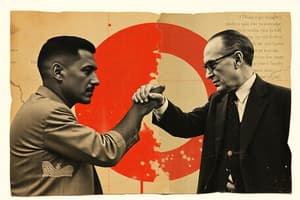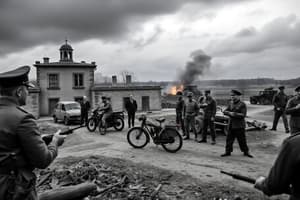Podcast
Questions and Answers
What is the definition of conflict?
What is the definition of conflict?
- A serious disagreement or argument (correct)
- Basic rights and freedoms for all humans
- The mixing of cultures and ideas
- The ability to influence or control behavior
What does power refer to?
What does power refer to?
The ability to influence or control the behavior of people
What are human rights violations and inequality?
What are human rights violations and inequality?
Basic rights and freedoms that are denied due to power imbalances
What is innovation?
What is innovation?
What is a revolution/rebellion?
What is a revolution/rebellion?
What does environmental impact signify?
What does environmental impact signify?
What is the impact of nationalism?
What is the impact of nationalism?
What is the impact of imperialism?
What is the impact of imperialism?
What is scarcity?
What is scarcity?
What does modernization imply?
What does modernization imply?
What is cultural diffusion?
What is cultural diffusion?
Flashcards are hidden until you start studying
Study Notes
Conflict
- Significant disagreements can occur between individuals, groups, or nations.
- Historical examples include the French Revolution, Imperialism, the Russian Revolution, WWI, and Latin American Independence Movements.
Power
- Represents the capacity to influence behaviors in various relationships, including familial, educational, and governmental contexts.
- Manifestations are evident in movements like the French Revolution, WWI, Ottoman Empire dynamics, and Latin American struggles for independence.
Human Rights Violations and Inequality
- Fundamental rights and freedoms are entitled to all humans but can be undermined by imbalances of power.
- Instances of violations are found in Imperialism, the Holocaust, the Armenian Massacre, the French Revolution, and Latin American Independence Movements.
Innovation
- Refers to new methods, ideas, or changes with varying positive and negative effects.
- Key historical moments include the Agrarian Revolution, Urbanization, Modernization, Industrialization, and WWI.
Revolution/Rebellion
- Occurs when groups seek to overthrow or replace existing government structures or leaders.
- Notable examples include the French Revolution, Russian Revolution, Sepoy Rebellion, and Boxer Rebellion.
Environmental Impact
- The condition of our living spaces affects and is influenced by human actions, addressing aspects like resource access, disease prevalence, and climate change.
- Key events linked to environmental impact are the Industrial Revolution, WWI, Urbanization, Population Growth, and Collectivization.
Impact of Nationalism
- A robust pride in one's nation can result in both beneficial and detrimental outcomes.
- Examples highlight its effects in the Unification of Germany and Italy, WWI, genocidal actions, ethnic cleansing, and Latin American Independence Movements.
Impact of Imperialism
- Involves domination by one nation over another, resulting in significant advantages for the imperial nation often at a high cost to the subordinate nation's economy and human rights.
- Historic occurrences include the Berlin Conference, the Opium War, the Boxer Rebellion, the Sepoy Rebellion, and Latin American Independence Movements.
Scarcity
- The insufficiency of resources such as water and oil often leads to interdependence through trade.
- Events connected to scarcity include the Industrial Revolution, Imperialism, WWI, and the concept of Nationalism.
Modernization
- The westernization of many countries has led to technological advancements, often countered by the erosion of traditional culture.
- Key examples are found in Meiji Japan and the modernization processes in China and India.
Cultural Diffusion
- The blending of cultures, ideas, and resources fosters innovation and global interconnectedness.
- Historical instances of cultural diffusion are evident in Japan and nations impacted by Westernization.
Studying That Suits You
Use AI to generate personalized quizzes and flashcards to suit your learning preferences.




